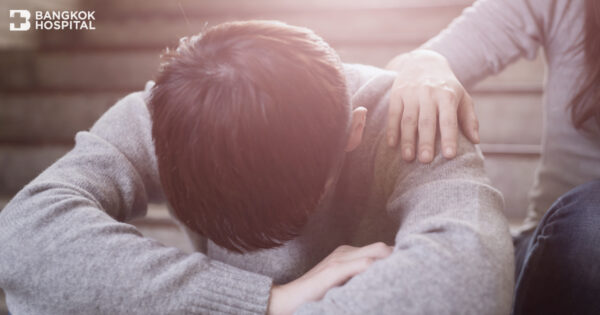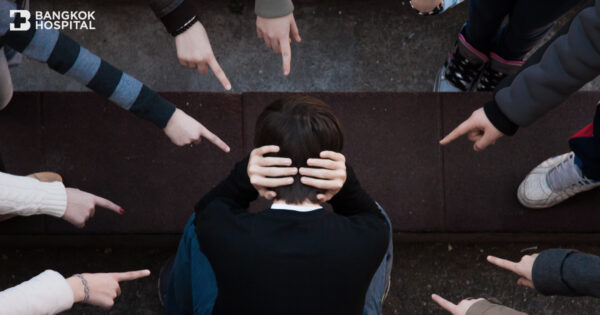Amid the global crisis of COVID-19 pandemic which has been increasingly spreading, the novel coronavirus, in addition to its health impacts on a large number of populations across the world, has disrupted the lives of millions more. People have faced uncertainty over their medical conditions, strict management of their daily lives, social isolation, unemployment, financial constraints, families and other issues. In addition, doctors, nurses and medical personnel are frightened for themselves and the patients they are treating during the COVID-19 outbreak. Besides physical health effects, this has generated mental health crisis worldwide. In the face of this pandemic and the turmoil it has caused, psychiatrists suggest the following guidance for coping with stress while maintaining mental health status.
Anxiety is a normal reaction to the stress especially when people have to deal with crisis moments
The outbreak COVID-19 is extremely stressful for people. Fear and anxiety about a disease can be overwhelming and cause strong emotions. In fact, the feeling of being stressed can be typically triggered by an event that makes people feel frustrated or nervous. Anxiety is a feeling of fear, worry or unease. It can be a reaction to the stress. During COVID-19 pandemic, stress and anxiety are appropriate responses to raise awareness, allowing people to carefully plan and effectively manage the situation. Without stress and anxiety, a number of people would have ignored all disease control measures and denied complying preventive policies. As an undesired result, it potentially enhances disease transmission to the families and wider communities, causing disease even more difficult to be kept under control. Everyone reacts differently to stressful situations. Nonetheless, stress and anxiety should be properly managed. People can first mitigate stress by taking all measures recommended by health authorities to reduce risks of infection such as frequent handwashing and social distancing. To relieve anxiety, it is recommended to maintain a routine involving a balance of time, relaxation and connecting with friends and families preferably through technology. To avoid being overwhelmed while paying attention to reliable sources of news on the pandemic, taking breaks from time to time including from social media is highly suggested.
In accordance with Centers for Disease Control and Prevention (CDC), the leading national public health institute of the United States, people should be able to notice their warning signs of being extremely stressed including:
- Emotional fluctuation or mood swings
- Fear or anxiety
- Being bored or being ignorant
- Irritability, frustration, becoming angry or being short-tempered easily
- Difficulty sleeping or changes in sleep
- Having recurring nightmares
- Changes in eating patterns e.g. excessive eating or decreased appetite
- Being inactive, agitation, tiredness or lack of energy
- Lack of personal interests
- Impaired concentration, being forgetful and poor performance
- Trouble thinking or making decisions
- Increased use of alcohol, tobacco or other illicit drugs
- Feelings of sadness, tearfulness, emptiness or hopelessness
- Worsening of chronic health problems in patients who have underlying diseases such as diabetes, hypertension, chronic kidney disease and cardiovascular diseases. Aggravating symptoms usually include abdominal pain, headache, body ache and skin rash.
Placing emphasis only on physical health impacts, mental health during pandemic might be overlooked. Some people do not realize their emotional alterations, resulting in inefficient arrangements, lack of concentration and poor working performance. These tremendously interfere with the relationship of personal life, colleagues and family. The prolonged accumulation of momentary stress leads to an increase in long-term cumulative stress and impact on overall health.
Common concerns that people request a psychiatric consultation
During the crisis of COVID-19 outbreak, people have sought mental advices for these concerns:
- Being afraid of infections:
Since COVID-19 disease is extremely contagious, it can strike anyone including healthy people even though the ones with particular conditions such as being the elderly, diabetes, cardiovascular diseases and neurovascular diseases as well as chronic respiratory diseases are at greater risks to develop more severe complications. People have panic attacks created by intense fear of being infected. A person becomes extremely concerned if any surrounding people gets infections and it might be transmitted without being aware. Only mild manifestations such as dry cough, runny nose or fever are suspicious. The frequently asked question is whether to seek medical assistance and COVID-19 testing. - Feeling overwhelmed due to rapid changes:
Real-time updates on numbers of infected cases, daily death tolls and overall situations worldwide are available. Statistical trends and figures have been closely monitored and reported by health authorities. Due to the frequent changes of obtained information, national policies in each country announced by their governments have been altered accordingly. These rapid changes potentially create high degree of uncertainty in the nations, resulting in unpredictable plans and stressful situation. Schools have closed and all international flights have been cancelled. Unnecessary travels in and out of the countries have been strictly banned. Some people have been notified their forced resignations within a day, thus no preparations can be arranged for such urgency. Some mobile applications have been technically designed to notify hourly updates on COVID-19 news. These applications alert every time when each new confirmed case is reported, creating unnecessary panic in the communities. In fact, sharing the reliable information derived from credible sources and understanding the risks to yourself and people you love can make an outbreak less stressful. - Employment status and financial constraints:
All around the world, overall levels of concern, besides physical health are intensifying as the pandemic progresses. These include economic crisis, unemployment and financial impacts. A large number of industries such as hotels, airlines, community malls has to close down and face unbearable effects generated by this pandemic. As a consequence, millions of employees have to get fired or laid off. Therefore, people have to cope with their inevitable financial constraints, causing cumulative stress and anxiety. - When this disease will be eventually terminated:
This emerging infectious disease caused by the novel coronaviruses is thought to be much more contagious than other viruses which belong to the same family, making it a global pandemic. Although scientists around the world are racing to develop vaccines and medicines to encounter with this disease, when COVID-19 nightmare is entirely terminated remains unknown. The most concerning issue is whether this outbreak will be ending. If so, will there be any possibility to have a second wave of COVID-19 pandemic? The past pandemics have typically lasted 12 to 36 months. Based primarily on the baseline predictions of COVID-19 disease, this pandemic might last until 2021. As a consequence, global economic effects created by this outbreak continues rising, affecting millions of people around the world. Although most governments have implemented restrictions and lockdowns which are being extended across much of the world while preventive measures including social distancing are stepped up, recently most countries have not known yet if the outbreak’s peaks have reached. Even all instructions and policies are well complied, the termination of this pandemic is literally thought not to happen any time soon.
Patients with mental health disorders in the COVID-19 pandemic are more likely to develop aggravating signs
Before the COVID-19 pandemic emerged, World Health Organization (WHO) has reported in the beginning of 2020 that depression has affected approximately 264 million people worldwide. The burden of depression is on the rise globally. Particularly in Thailand, the rates of suicidal attempts had increasingly continued in 2017- 2018 from 4.94 to 5.33 per 100,000 population, respectively. Besides depression, anxiety is another common mental illness. Recent statistical data derived from The Anxiety and Depression Association of America indicates that anxiety has widely affected 40 million adults in the United States or 18.1% of the population every year. This figure does not include those who have alcohol additions. Additional stress induced by this pandemic can significantly trigger their underlying symptoms, resulting in aggravating mental disorders although treatments have been continuously given. Since patients with mental health problems have certain health conditions that raise their risks for developing more serious complications if they become infected, thus this group of patients may be among the hardest hit. Psychiatric patients should strictly follow their appointments and health instructions advised by their specialists. E-mental health program leveraging internet and related technologies such as smartphone apps, web sites and social media recently helps to deliver mental care services with ease and convenience. For people who are at risk for developing mental health conditions, medical advices should be also sought in order to receive appropriate treatments if necessary.
How to effectively cope with COVID-19 pandemic
People respond to the outbreak differently depending on their background. People who may react more strongly to the stress include older people with chronic diseases, medical responders such as doctors, nurses and other health care providers as well as patients who have mental health conditions including problems with substance use. Nevertheless, everyone can face cumulative stress while dealing with the situation. These recommendations significantly help to manage stress associated with COVID-19 outbreak.
- Stay informed but calm and do not panic
Being excessively stressed can lead to long-term effects including feeling emptiness and hopelessness, resulting in inappropriate decision making and responses such as intentional self-harm, suicidal thought, resignation, relocation, getting a divorce, impaired judgment and risk-taking behaviors as well as poor relationship with friends, family and colleagues. It is highly recommended not to make any important decision during this moment. Only continuing daily life with extra care and staying away from infections are crucial. - Know the facts to help reduce stress
Excessive consumption of news on the pandemic must be avoided. If necessary, checking updates only once a day is sufficient to prevent overwhelming feelings. Taking breaks from watching, reading or listening to stories including social media is advised. Hearing about the pandemic repeatedly can be upsetting. In fact, sharing accurate information about COVID-19 obtained from reliable resources can make an outbreak less stressful. - Comply with preventive measures and disease control policy instructed by health authorities
Instructions and measures announced by health authorities and government must be strictly followed. These include personal hygiene, frequent handwashing, social distancing, wearing masks and avoiding exposure to endemic areas or suspected cases.
4 ake care of mental health
Not only physical health and well-being, but mental health should be also well looked after. Warning signs of mental illness must be closely observed such as feeling depressed or hopeless, sleep disturbance, changes in eating patterns, emotional fluctuation and increased alcohol intake. If any abnormal sign presents, medical assistance should be provided as soon as possible. Delayed consultation may result in chronic stress with long-term health impacts. People with preexisting mental health conditions should continue with their treatments and be aware of new or worsening symptoms that might arise.
- Make time to unwind
Although this crisis limits the freedom and flexibility of our lives, to get rid of stress, people should continue living as usual as possible. If boredom develops during a 14-day quarantine time, some joyful activities should be considered. In addition, healthy habits should be regularly maintained
Tips for a healthy routine
- Eating healthy foods with well-balanced meals. In fact, cooking at home is more economical than eating out. Food delivery can be occasionally considered.
- Getting sufficient sleep. Lack of sleep can affect immune system. Medical researches widely prove that adequate sleep does not only help to prevent depression, but it also minimizes the risks of viral infection. To obtain a quality sleep during nighttime, mobile phones must be switched off or put into a silent mode.
- Staying connected with other people through communication technology such as social media and apps. Self-isolation without routine conversation or interaction with people might be a potential factor to develop stress and anxiety.
- Continuing daily life as usual. During free time, interesting activities must be conducted. Staying active and productive while working from home. Routine tasks should be continued such as waking up in the morning, taking a shower, having exercise, house cleaning, cooking and gardening. Having an active life greatly reduces risks to develop depression and anxiety.
- Finding new interesting hobbies and recreational activities. Although several activities have been restricted during COVID-19 pandemic, a wide range of recreational hobbies are also available. These include drawing, baking, playing a musical instrument, creating lyrics, jigsaw puzzles, yoga and having a foreign language class.
- Attitude adjustment. Even though this pandemic is highly worrisome, it is essential to keep yourself reminded “no worries and do not panic”. Cognitive Behavioral Therapy (CBT) can be an effective tool to help anyone learn how to better manage stressful life situations. These include:
- Identify troubling situations or conditions that happened. If anger, disappointment, grief or sorrow develops accompanied with abnormal signs such as palpitation, sleep changes, headache, irritability and weakness, it is recommended to take a 5-minute moment to reconsider the exact causes of these reactions. If unsure or unidentified, additional opinions and advices derived from surrounding people such as friends and family could be asked for.
- Identify negative thinking and become aware of these thoughts. In case that negative feelings are clearly sensed, there is no need to force them to be positive ones. The principle, instead, is to ground on the facts neutrally that both positive and negative sides are typically normal. Days are filled with good and bad news and so are lives. Becoming aware of these negative thoughts is important while overreacting should be avoided. Besides understanding and reacting appropriately, being worried about worrying should not be induced.
- Accept the truths and have a move on. In certain circumstances, failures might come inevitably even though the best efforts have been put. In some industries, companies have closed down and employees have been fired or laid off unavoidably. People in the management positions might put all blame upon themselves that their managerial performances do not get their business and employees survived. Elderly people are at greater risks to develop serious illness if they become infected. Family members who live far away from their elderly parents might have guilt tripping since they are unable to take care of their parents while facing such situation. Even though people are doing their best to continue their roles, it might be felt inadequate to cope with an ongoing crisis. Across the countries, healthcare workers such as doctors and nurses have put their huge efforts to taking care of sick people who are infected. These medical staff might not have enough time to spend for caring their loved ones such as their parents with chronic medical conditions who are also at higher risks to experience critical symptoms if they are infected. It is worth mentioning that acceptance mistakes is the key. During this global crisis, it is not the right time to put a guilt trip on anyone in particular. Currently, the most essential things are encouragement and supports in all possible ways. We will never regret if what we have done is the absolutely best thing that we could possibly do among high levels of limitations and constraints.
- Mindfulness. Health organizations worldwide have predicted that COVID-19 crisis will be continued for a long while. Fighting off COVID-19 pandemic is deferred to the marathon. Speeding up to reach the destination without thorough plans might lead to running out of energy at the end, resulting in failures. Energy should be preserved and used gradually. Taking things slowly greatly helps to reduce excessive stress. Daily life can be more enjoyable if it is looked into different angles. The smell of coffee, shampoo or shower gel can be more pleasant if you could have spent 5-10 seconds more with them. In mindfulness-based therapy, people focus on the bodily sensations that arise when they are anxious instead of avoiding or withdrawing from negative feelings. Mindfulness can enhance emotional well-being, allowing people to be encouraged and able to cope with the situation efficiently.
- Sharing is caring. Although social distancing is mandatory, staying connected with others though communication technology is accessible. Serious talk about the situation should be avoided in order to reduce the stress of the community. Personal interactions should be retained while hygienic precautions are strictly followed e.g. wearing masks and frequent handwashing. Sharing shared feelings does not only help reducing stress, but it also expresses caring to the ones we love and care about. Everyone has to be aware and encouraged to battle against this pandemic. Together we will eventually prevail.









